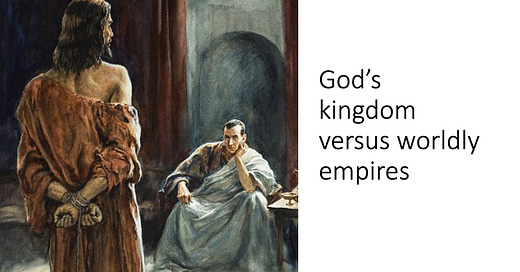Memorial of Saint John Chrysostom, Bishop and Doctor of the Church
Psalm 145:2-3, 10-13ab
In the Book of Daniel, there is a chapter that contains the prophet’s vision of four terrifying beasts (see Daniel 7:1-8). Each beast represented an empire that was oppressing God’s people throughout their history. Those empires are usually identified as Assyrian, Babylon, Persian, and Greece. It is worth noting that the biblical author compares human empires to wild, cruel animals that are incapable of showing mercy.
In the time of Jesus, another empire took control of the people of Israel, the Romans. Wherever the Roman legions went, they claimed to bring peace. But, from the perspective of defeated and oppressed nations, they brought war, destruction, and humiliation. The “Roman Peace” was a nightmare for those who after their defeat were incorporated into the Roman empire. The Roman eagle could be easily added to those four terrifying animals from the Book of Daniel.
But, as the vision of Daniel continues, the prophet sees “the thrones” being placed, the Lord taking his seat and the judgment was pronounced over the beasts: the most terrifying one was killed, the others were removed from their position of power (see Dan 7:9-12). But then, someone like a human being is brought to the Lord and he is made a ruler over all the nations and his reign will last forever (see Dan. 7:13-15). A kingdom run by a human being replaces beastly empires. What is going on here?
The answer comes in the New Testament. At the heart of Jesus’ proclamation was God’s kingdom that defers from worldly empires and kingdoms. The point is not only that Christ’s kingdom is not of this world (see John 19:26) but most notable in the fact that God’s kingdom proclaimed by Jesus liberates, heals, and raises to life. God’s kingdom does not crush nations and people and then incorporate them and their territories into its own thus enlarging its territories. God’s kingdom comes to each person individually as a saving grace.
The psalmist speaks about the glorious splendour of God’s kingdom and prophesies that God’s “kingdom is a kingdom for all ages, and [His] dominion endures through all generations” (Ps 145:13ab). The same prophecy was spoken about the kingdom given by the Lord to that mysterious person resembling “a son of man” (Dan 7:13). Jesus often referred to himself as “the son of man” and “all authority in heaven and on earth has been given to” him (see Matt 28:18). Finally, there is a king who rules with justice and mercy, and teaches us what it means to be truly human. Therefore, with the psalmist we pray: “may [our] mouth speak the praise of the LORD, and may all flesh bless his holy name forever and ever” (Ps 145:21).





Check